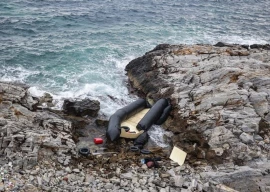
The UN observer mission tasked with monitoring the ceasefire line between India and Pakistan is identifying possible alternative locations for its office in India after it was asked by the Indian government to vacate its current premises in New Delhi.
The UN Military Observer Group in India and Pakistan (UNMOGIP) had been allotted a government bungalow on the Purana Qila Road in New Delhi 40 years ago, free of charge.
The new Indian government, however, has asked the mission to vacate the government bungalow to "rationalise" the presence of the group which the government said has "outlived its relevance".
"UNMOGIP has received the Indian Government's request to vacate the premises that it is using in New Delhi. The mission is currently conducting a market survey to assess costs and identify possible alternative locations."
Spokesperson of the Indian External Affairs Ministry Syed Akbaruddin said that it has been India's "consistent and long- standing view that UNMOGIP has outlived its mandate".
The Indian position on the group has been that UNMOGIP's role has been overtaken by the Simla Agreement and the consequent establishment of the Line of Control.
Akbaruddin further said that the government is in budgetary season and "everybody is tightening their belts." He added that "rationalisation means that you pay for what you get."
UNMOGIP observers have been located at the ceasefire line between India and Pakistan in Jammu and Kashmir since 1949 and supervise the truce between the two neighbours.
As of May, UNMOGIP has 40 military observers, 23 international civilian personnel and 45 local civilian staff. The observer group is financed by the UN regular budget and appropriations for biennium 2014-2015 are stated to be $19.64 million.
Meanwhile, UN spokesperson Stephane Dujarric was on Tuesday asked at a daily briefing whether the decision to close down the UNMOGIP office has implications on the Kashmir issue.
"Definitely, I agree with what you just said," was her reply.
COMMENTS (7)
Comments are moderated and generally will be posted if they are on-topic and not abusive.
For more information, please see our Comments FAQ



1723032398-0/BeFunky-collage-(36)1723032398-0-165x106.webp)













India just "testing"...If Pak stand has changed over time for some unknown reason!
@Tahir:
1) Please enlighten us with the "un-distorted" version 2) Your speculation of what an Indian newspaper would do is irrelevant
@gp65:
Which part of this sentence of the Simla Agreement you do not understand "Neither side shall seek to alter it unilaterally, irrespective of mutual differences and legal interpretations. Both sides further undertake to refrain from the threat or the use of force in violation of this line.”. Please pay attention to the highlighted words. Militarily capturing Siachen constitute the violation of the terms "unilaterally" and "use of force". By the way, the current Indian positions on Siachen are tens of miles into the west of the imaginary line if extended to north as per the agreement of 1949, again which has no mention in the Simla Agreement. It only says the "line of control resulting from the ceasefire of December 17, 1971".
ET -You are very generous in allowing gp65 to distort history. If a Pakistani perspective is sent to readers comments in Indian paper, it get slashed.
@Bewildered: India has NOT violated Simla agreement. The LoC was physically demarcated until NJ9874. After that it was conceptual which said 'thence north to the glaciers'. By that definition which is included in the document signed in 1949 and reconfirmed in 1972, Siachen is on eastern side of the LoC. As such India simply occupied a part on its side of LoC which it had earlier left vacant after it found out plans that Pakistan was planning to occupy it.
Of course Pakistan says that Siachen is on its side of the LoC by creating some imaginary line from NJ9874 to KArakoram Pass. Considering that Karakoram pass is north east and not north and the document signed by both sides clearly says thence north to the glaciers, there is no merit to Pakistan's claims.
India has offered multiple times to physically demarcate rest of the LoC. For obvious reasons, Pakistan opposes. After all, there would be no basis to the claim on Siachen if the line was demarcated as agreed.